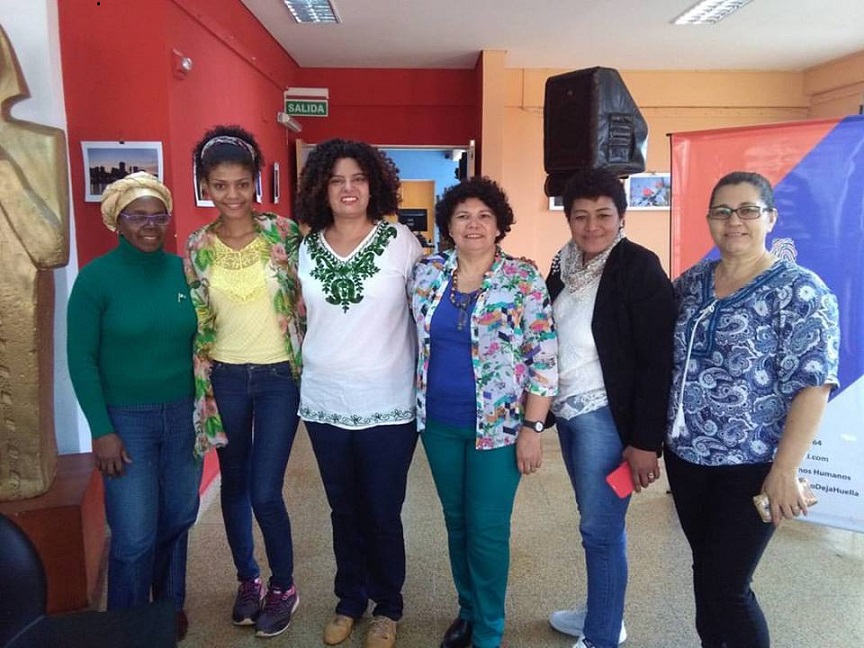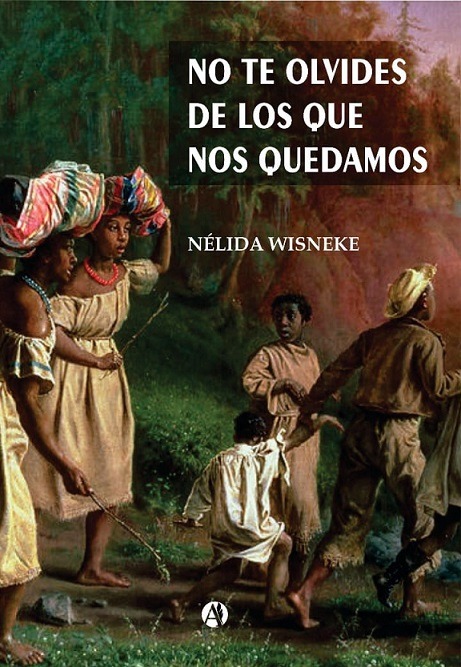By decision of the interviewee, the article contains inclusive language.
“At home they told me come, I’m going to fix your ‘coroa’ and it was confusing until I understood what it meant. By the way, the coroa (crown) of my curly hair is so important, the symbolic union to reconnect with our ancestry, our history that sometimes many Afros do not know how it was. This is how Nélida Wisneke begins to put into words the history of her family and “relatives”, as she defines everyone who suffers exclusion and racism in life, in her native Misiones.
Paco Urondo Agency: What contributions and reflections does your narrative propose through Don’t forget those of us who stayed?
Nelida Wisneke: Do not forget… it is a literary work that is narrated in two languages, Portuguese and Spanish; and in various literary formats: prose, lyrics and verses that are popular and widely used among the peasantry that lives on the border with the Uruguay River, Brazil and in the province of Misiones, from which I am a native.
The entire book is an invitation to life and the desire for freedom inherent in human beings, beyond the territorial escapes of the characters that I am relating, the wounds, the pain, the suffering, the hunger and the thirst. This work tries to make known a social group, a people that has its subjectivity intact, its way of understanding the world, its rites, its beliefs, its living and latent spirituality, when hope seems to have run out. In short, it makes visible an impoverished people that resists, that wants to continue living but in freedom, managing their time, their history and their choices.
My book fundamentally contributes the idea of understanding Afro communities as complete human beings, without the need for someone to add or take away things from them. It is the look that we Afro-descendants have about our own history, it is our voices that narrate, our experiences, “escri-experiences”. It is the recognition of our ancestors and our ancestors, but also those of us who have come this far, championing our struggles and anti-racism as a way of life, as a political fact.
APU: In this sense, how did you start your path as a writer?
NW: I built myself as “the person, the woman who writes” by observing the things that happen around me, which I have been listening to throughout my existence. I believe that the person who writes finds in the context that moves all the material that is later transformed into a book, into poems, into a short novel, into a narrative. In this aspect, the people who write put into action a high sensitivity to observe the world from different places, with protagonists that appear throughout our lives and make what we narrate. Particularly in my book, they are real events brought to the level of fictional discourse. In this way, the stories come to occupy that empty space left by the official historiography when it decided to leave everything related to the Afro communities in our territory out of the textbooks.
APU: Just as some artists in the Afro community prefer to call themselves “artivists”, is there a search for a new language to name your work?
NW: That’s what it’s all about. It seems to me that it is necessary for us to review the conceptualization that comes from the term “writer-writer” and its Western perspective. I believe that human beings write since we learn to put letters together, and we realize that these terms have or take on a different meaning depending on the context and the situation we are narrating. From this postulate, only the edition of a written work transforms the person who wrote the story into a writer. However, it seems to me that it is a lack of recognition towards many colleagues in the Afro community who have written beautiful works all their lives, but who have not had the opportunity to publish.
Therefore, I became “the woman who writes” in my community, for my community. And what I have achieved I also owe to my community. I had the enormous opportunity to send those works, and after many rejections we managed to finally get the book out by decision of a publishing house.
APU: What was the reception of the book in the Afro-missionary community and how does it affect your militancy?
NW: Don’t forget those of us who stayed narrates the experience of several of the ancestors of the members of the Afro-missionary community, therefore we celebrate it and celebrate it every day. We are going through a stage of emotional reconstruction and the book is for us to meet and share life stories. Also, in each meeting, we take advantage of this community bond to read a chapter of the book, or reread the previous chapter for everyone, especially for those people in the community who are illiterate, so that they can go on rescuing in their memories their own experiences and reconstructing cultural values. I feel like I am fulfilling a social and ancestral duty.
APU: What is, in your opinion, the greatest legacy of our African and Afro-descendant ancestors?
NW: We owe everything to our African and Afro-descendant ancestors, from the transmission of knowledge related to the community, solidarity, healing rituals, nature, respect, empathy, silence and the word. We thank you for listening attentively to what the other wants to share, we owe you the silent but constant and active fight, which taught us not to give up, to follow hard the objectives, not to give up even if sometimes it hurts. All the strength that we women have and that our daughters and sons have was transmitted by our mothers, our ancestors.
So I always thank African women with all their knowledge of the properties of herbs, which have to do with the day, the night, with the cardinal points and their energies to heal the pains of the soul, of the body and the pains that brought us the existence of being different.

APU: What are the advances and challenges of black and Afro-descendant women in this new commemoration of July 25?
NW: I think that after two decades of celebrating Afro-Latin, Afro-Caribbean and Diaspora Women’s Day, this stage finds us Afros more united, more mature, more confident and stronger, and absolutely convinced that the fight that we have been holding is a fair and necessary struggle, so that our daughters and granddaughters never again have to suffer discrimination and racism anywhere in the world. Society taught us Afro-descendants to see the strength and courage in other women, without telling us that this strength is also in us, that is why it is very important that the anti-racist work that the compañeras of the Afro communities have been doing, which It is not an easy job and it is essential that the recognition be in life.
And in this sense, it is that we must continue fighting for equity, to access the rights that correspond to us because many of us continue to be excluded. For this, it is necessary to work as a community, and not allow the fragmentation tools that the Colony or the white hegemony has used to manage us, to endure among us. We definitely have to say no to divisions among us, just as much as we say no to racism.
“We owe our silent but constant struggle to our African and Afro-descendant ancestors” – Rebelion

